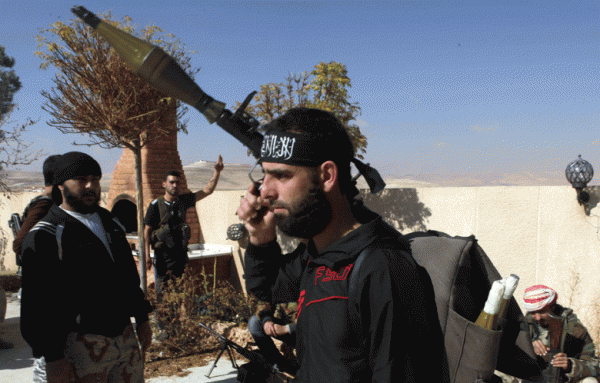
Several areas of West Qalamoun have been witnessing since two days, a fierce wave of raids conducted by Jabhat al-Nusra against ISIS strongholds and checkpoints, and clashes erupted between both groups, according to report by Al Monitor
As a result of the campaign, dozens of IS members, including leaders and emirs, were arrested. On the first day, about 47 members were detained, according to Al Monitor sources.
Those included IS prominent leader Abdullah al-Iraqi, who is considered, along with Abu Balqis al-Iraqi who was not arrested, the actual leaders of IS in West Qalamoun. It was also reported that emir Abu al-Baraa, who was mentioned in the two previous statements issued by the group, was arrested. Oddly enough, Talli had addressed him in one of the previous statements with respect.
The strange aspect of the sudden decision for battle that was implemented before it was officially declared is that it came only a few hours after two statements issued by Talli were leaked. Several al-Nusra leaders, like Abu Maria al-Qahtani, confirmed the authenticity of the statements, the first of which included a request for IS to help al-Nusra and support it in Assal al-Ward and al-Jibbah against the Syrian army and Hezbollah. The second statement included a nominal permit for an IS leader allowing him to cross al-Nusra’s checkpoints with any person whose religion he trusts.
How, then, could Talli request IS’ help and allow its leaders and members to cross al-Nusra’s checkpoints, and a few days later, wage an inclusive war against the group?
To clarify matters, a source close to al-Nusra told the Lebanese daily As-Safir, “The war decision against Kharijites is final and does not involve West Qalamoun only, but also other regions such as East Qalamoun, Wadi Barada and al-Zabadani.” The source noted that “the fights will persist until Kharijites are eliminated, and until they repent and hand themselves over for punishment for the bloodshed they committed.”
“The campaign has resulted in expelling Kharijites from al-Jibbeh and al-Maara,” the source added.
Regarding the two statements and their contradiction with the fighting decision, the source stated, “Talli recently issued a decision to forbid Kharijites from participating in any fight alongside al-Nusra. But, when talk about the Qalamoun battle started, some IS leaders asked him to allow them to participate. He realized that unity was needed to respond to Hezbollah’s attack to achieve the higher interest. So, he allowed IS members to fight and issued permits for some leaders to cross al-Nusra’s checkpoints.”
The source added that “the Kharijites, as usual, tried to take advantage of the situation to strengthen their position, and they attacked an al-Nusra checkpoint and arrested some members.”
This prompted Talli to decide that the time has come to eliminate them. The timing of their attack — which coincided with the attack of their common enemy, Hezbollah — angered him.
Talli took his decision a week after al-Nusra in East Qalamoun issued a similar statement asserting “its persistence in fighting Kharijites until its last breath to push them to take back their takfiri trend and bloodshed against Muslims.” Practically, this means that Qalamoun has entered a new stage of conflict, as it was considered, until recently, one of the few remaining Syrian regions which were safe from the jihadi strife since its outbreak in April 2013.
Talli played a big role in preventing the spillover of the strife to Qalamoun. In early 2014, he issued a famous statement in which he rejected fighting IS and threatened “any faction that attacks IS locations of becoming a permissible target for Jabhat al-Nusra.” Talli was convinced that “Jabhat al-Nusra and IS had the same approach”— an opinion that is not shared by al-Qaeda’s leader, Ayman al-Zawahri, who talked more than once about “an ideological dispute” between both parties. Less than a year later, in January, although IS emir in Qalamoun, Abu al-Walid al-Maqdisi, issued a fatwa to consider Jabhat al-Nusra takfiri, Talli held on to his convictions. He refused in a statement to describe IS members as Kharijites, asserting, “We owe them since they are our brothers in religion. We cannot call any IS members Kharijites.”
However, Talli indicated in that statement a significant point showing that he did not rule out all possibilities of fighting IS. He might have even expected it.
He noted, “We would not fight any Muslim without a reason. It is not in our ideology.” This means that in case of reasons, fighting would be a possibility. And this is what seems to have happened in the past two days.
Although a previous source had asserted to As-Safir that confrontations with IS are limited to certain regions and won’t affect the battle front with Hezbollah and the Syrian army, the situation depends on the nature and course of developments. The repercussions cannot be speculated. Battles against IS are raging on several fronts — Aleppo, Homs, Ghouta and East Qalamoun. Will Jabhat al-Nusra be able to eliminate IS from Qalamoun within a few hours, as its [Jabhat al-Nusra] advocates claim, or will things take a different turn?
The Syrian army and Hezbollah militants tightened the noose on al-Khirba crossing in Qalamoun’s barren lands.
The battle has started to take over Ras Maara’s barren lands, and violent clashes have broken out in al-Barouh highland in that area.
This highland is considered a strategic position as it overlooks Ras Maara and the Lebanese borders.
The Syrian forces and Hezbollah’s militants have controlled al-Jibbeh barren lands completely, as well as Moaysra and its valley, which was a training camp for militants, and Sahel al-Watiya.
They also tightened their grip on Qornat Abdel-Haq that overlooks the Lebanese Nahle barren lands. This hill is 2,428 meters [7,966 feet] above sea level. The operations claimed the lives of many militants and wounded others.
Al Monitor
Leave a Reply
You must be logged in to post a comment.